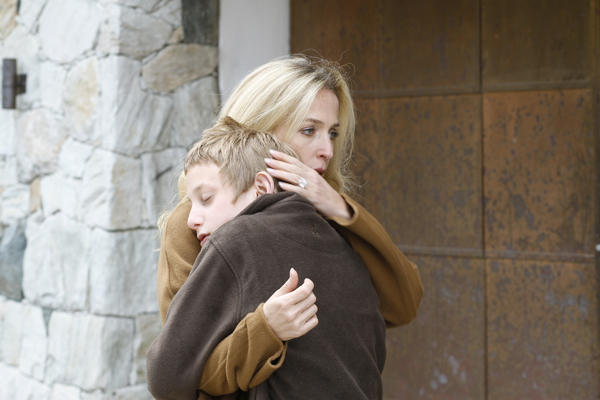
Gillian Anderson embracing Kacey Mottet Klein in SISTER (Adopt FIlms)
Switzerland’s submission for the best foreign-language Oscar, Sister gives a fresh, contemporary heart and look to the familiar story of the poor young townie out of his element at an expensive vacation resort. High up in the Alps, scrawny 12-year-old Simon (Kacey Mottet Klein) sneaks around bathrooms and service hallways to grab fancy gear the rich tourists casually leave around as they relax and ski. Down at ground level, he stashes the stolen goods in his locker to sell them to his housing project classmates.
He also meets up with a foul-mouthed, blonde young woman just as she angrily quits her job at a convenience store. He’s used to taking care of her, his older sister Louise (Léa Seydoux), after she leaves numerous jobs (or men), and he buys her dinner with his ill-gotten profits. Yet for all his wheeling and dealing, he still looks like a hurt little boy when she dumps him and his Christmas celebration to go out with the guy who insistently honks his car horn for her.
To keep supporting them, he rides up in the cable car into the blue sky and bright white snow, dressed up in stolen goggles and outerwear, looking like a different person who fits right in with the skiers at the mountain lodge. Simon also enters into a different emotional environment when a British tourist (Gillian Anderson) starts to become more appealing to him for her maternal attention, rather than as an easy mark. But he keeps lying and stealing, and is caught in the back lodge warrens peopled by foreign workers, where his tricks are discovered. As a result, Simon is compromised into a smuggling partnership and an uneasy mentorship, and his relationships with these older parental figures spin more out of control than any kid could handle.
Director Ursula Meier, who also featured scrappy young Klein in her dystopian and more horizontal 2009 debut feature Home, avoids bathos while the overall tone remains sympathetic, and the script reveals unexpected depth in the heartbreaking bond between Simon and Louise—Seydoux gives Louise’s frustration depth. The conflicts between different classes occupying adjacent spaces reach back to William Wyler’s Dead End (1937) and Hal Ashby’s The Landlord (1970), but Meier brings it up-to-date here with a lot of hand-held, close-up digital camerawork in the spare, realistic style of the Dardenne brothers.
















Leave A Comment